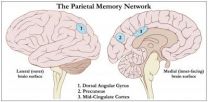(Press-News.org) One of the more heartbreaking realities of Alzheimer's is the moment when a loved one struggling with the disease no longer fully recognizes a family member or close friend who is caring for them.
Now, new research from Washington University in St. Louis has identified a novel learning and memory brain network that processes incoming information based on whether it's something we've experienced previously or is deemed to be altogether new and unknown, helping us recognize, for instance, whether the face before us is that of a familiar friend or a complete stranger.
Forthcoming in the September issue of the journal Trends in Cognitive Sciences, the study pulls together evidence from multiple neuroimaging studies and methods to demonstrate the existence of previously unknown and distinct functional brain network, one that appears to have broad involvement in human memory processing.
"Activity in this network tells us if you're looking at something that you perceive to be novel or familiar," said Adrian Gilmore, first author of the study and a fifth-year psychology doctoral student in Arts & Sciences at Washington University. "When an individual sees a novel stimulus, this network shows a marked decrease in activity. When an individual sees a familiar stimulus, this network shows a marked increase in activity."
Study co-authors are Kathleen B. McDermott, PhD, professor of psychology in Arts & Sciences and of radiology at Washington University School of Medicine in St. Louis; and Steven Nelson, PhD, a graduate of the neuroscience doctoral program at Washington University.
Nelson is now the neuroimaging core chief at the U.S. Department of Veterans Affairs VISN 17 Center of Excellence for Research on Returning War Veterans in Waco, Texas. McDermott is principal investigator and director of Washington University's Memory and Cognition Lab.
Described by study authors as the Parietal Memory Network (PMN), the new memory and learning network shows consistent patterns of activation and deactivation in three distinct regions of the parietal cortex in the brain's left hemisphere -- the precuneus, the mid-cingulate cortex and the dorsal angular gyrus.
Activity within the PMN during the processing of incoming information (encoding) can be used to predict how well that information will be stored in memory and later made available for successful retrieval. The PMN exhibits opposite patterns of activity depending on whether the information being retrieved is recognized as new or familiar -- the more familiar the information, the more activity in the PMN, the study found.
Researchers identified interesting characteristics of the PMN by analyzing data from a range of previously published neuroimaging studies. Using converging bits of evidence from dozens of fMRI brain experiments, their study shows how activity in the PMN changes during the completion of specific mental tasks and how the regions interact during resting states when the brain is involved in no particular activity or mental challenge.
This study builds on research by Marcus Raichle, MD, the Alan A. and Edith L. Wolff Distinguished Professor of Medicine, and other neuroscience researchers at Washington University, which established the existence of another functional brain network that remains surprisingly active when the brain is not involved in a specific activity, a system known as the Default Mode Network.
Like the Default Mode Network, key regions of the PMN were shown to hum in a similar unison while the brain is in relative periods of rest. And while key regions of the PMN are located close to the Default Mode Network, the PMN appears to be its own distinct and separate functional network, preliminary findings suggest.
Another characteristic that sets the PMN apart from other functional networks is that its activity patterns remains consistent regardless of the type of mental challenge it is processing.
Many regions of the cortex jump into action only during the processing of a very specific task, such as learning a list of words, but remain relatively inactive during very similar tasks, such as learning a group of faces, The PMN, on the other hand, exhibits activity across a wide range of mental tasks, with levels rising and falling based on how much a task's novelty or familiarity captures our attention.
"It seems like the amount of change relies heavily on how much a given stimulus captures our attention," Gilmore said. "If something really stands out as old or new, you see much larger changes in the network's activity than if it doesn't stand out as much."
The consistency of these patterns across various types of processing tasks suggests that the PMN plays a broad role in many different learning and recall processes, the research team suggests.
"A really cool feature of the PMN is that it seems to show its response patterns regardless of what you're doing," Gilmore said. "The PMN doesn't seem to care what it is that you're trying to do. It deactivates when we encounter something new, and activates when we encounter something that we've seen before. This makes it a really promising target for future research in areas such as education or Alzheimer's research, where we want to foster or improve memory performance broadly, rather than focusing on specific tasks."
INFORMATION:
Multigene testing of women negative for BRCA1 and BRCA2 found some of them harbored other harmful genetic mutations, most commonly moderate-risk breast and ovarian cancer genes and Lynch syndrome genes, which increase ovarian cancer risk, according to an article published online by JAMA Oncology.
Multigene panel genetic tests are increasingly recommended for patients evaluated for a predisposition to hereditary breast/ovarian cancer (HBOC). However, the rapid introduction of these tests has raised concerns because many of the tested genes are low- to moderate-risk genes ...
A study by researchers at three academic medical centers has shown that screening women with a suspected risk of hereditary breast or ovarian cancer for risk-associated genes other than BRCA1 and 2 provides information that can change clinical recommendations for patients and their family members. The report from a team led by a Massachusetts General Hospital (MGH) Cancer Center investigator is being published in the August issue of JAMA Oncology.
"The traditional approach has been to test most women with suspected hereditary risk for breast and/or ovarian cancer for ...
A University of Manchester study which followed up 38,415 people admitted to hospital with self-harm has, for the first time, investigated the association between the treatment patients receive in hospital and their subsequent risk of death.
Published in the Lancet Psychiatry, the study looked at adults who had self-harmed and attended five hospital emergency departments in Manchester, Oxford and Derby between 2000 and 2010. The researchers found that within 12 months, 261 had died by suicide and a further 832 had died from other causes.
The study also examined the ...
Organ transplant recipients are twice as likely to develop melanoma as people who do not undergo a transplant, and three times more likely to die of the dangerous skin cancer, suggests new research led by a Johns Hopkins Bloomberg School of Public Health student.
The findings, reported Aug. 13 in the Journal of Investigative Dermatology, suggest that the immunosuppressive medications that transplant recipients receive to keep them from rejecting their new organs -- especially the high doses administered at the time of transplant -- may make them more susceptible to later ...
A study on granting local sales people pricing discretion shows that profits improve by up to 11% when local sales forces are empowered to negotiate with customers. However a centralized system that uses optimization techniques and limits local sales discretion improves profits still further, by an additional 20%. The research appears in the current issue of Management Science, a publication of the Institute for Operations Research and the Management Sciences (INFORMS), the leading professional association in analytics and operations research.
"This hybrid approach balances ...
Summary: Children born with the major congenital heart defect hypoplastic left heart syndrome (HLHS) often must undergo a series of corrective surgeries beginning at birth. While most have the standard three-stage Norwood procedure, a hybrid strategy has been introduced to offset some disadvantages associated with the Norwood surgeries. In a report in The Journal of Thoracic and Cardiovascular Surgery, investigators compare whether outcomes can be improved if an arterial shunt is used as a source of pulmonary blood flow rather than the more conventional venous shunt as ...
For smokers, the number of cigarettes smoked per day and current body mass index are predictive of changes in weight after quitting smoking, according to researchers at Penn State College of Medicine.
Quitting smoking may lead to some weight gain but how much weight gain depends on the individual. Previous research shows that for some it can be just a few pounds, but for others it can be more than 25 pounds. Unfortunately, factors that can help predict the amount of weight a smoker may gain are not well understood.
"Many smokers are concerned about gaining weight after ...
PHOENIX -- A multicenter study involving Mayo Clinic researchers has found that the National Cancer Institute's Patient Reported Outcomes version of the Common Terminology Criteria for Adverse Events (PRO-CTCAE), was accurate, reliable and responsive, compared to other, established patient-reported and clinical measures. The study is published today in the journal JAMA Oncology.
"In most cancer clinical trials, information on side effects is collected by providers who have limited time with their patients and current patient questionnaires are limited in scope and depth," ...
Early humans were the dominant cause of the extinction of a variety of species of giant beasts, new research has revealed.
Scientists at the universities of Exeter and Cambridge claim their research settles a prolonged debate over whether mankind or climate change was the dominant cause of the demise of massive creatures in the time of the sabretooth tiger, the woolly mammoth, the woolly rhino and the giant armadillo.
Known collectively as megafauna, most of the largest mammals ever to roam the earth were wiped out over the last 80,000 years, and were all extinct by ...
The discovery of antidepressant drugs in the 1950s led to the first biochemical hypothesis of depression, known as the monoamine hypothesis. This hypothesis proposes that an imbalance of certain brain chemicals is the key cause of depression. Research has investigated whether and to what degree the "reward and pleasure" chemical dopamine and, more recently, the "happiness" chemical serotonin, could be the neurotransmitters involved in the malady. However, the monoamine hypothesis does not seem to fully explain the complexity of human depression. Now a new study offers one ...

